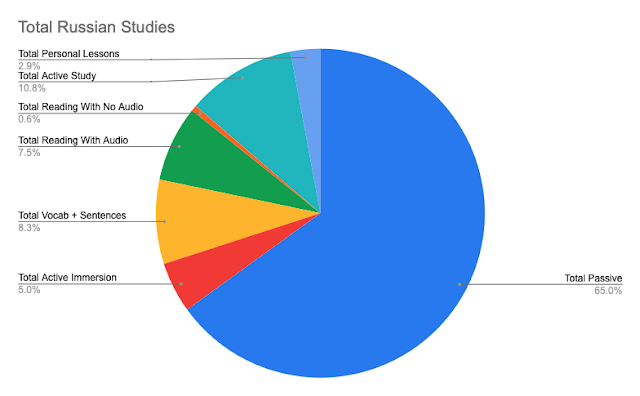Using Anki to learn the Roots of Russian Language
While researching how to learn / acquire the Russian language I saw recommendations for a book called Roots of the Russian Language. It lists a couple of hundred word root components that make up many Russian words, along with examples:
For example:
Parents: родители (raditeli)
Motherlands: Родина (radina)
Folk / people: народный (narodni)
I've owned the book for a while but have only occasionally had a look at it because the typography is old fashioned and not easily legible. But I recently saw someone on a forum explaining how important it was for them in expanding their vocabulary. So I had a look around and found an Anki deck that seems to be based on the book: Anki Deck: Roots of the Russian Language.
While I really don't enjoy using Anki (or any simple Spaced Repetition System) I'll have a go at working through this deck. I'll start with adding 10 new words a day but will lower it if my revision time goes over 20 - 30 minutes. There are 333 cards in the deck, so perhaps I can work through it in 2 or 3 months.
The cards are for recognition only; Russian roots on the 'front', English on the 'back'. There is no audio and there are no example words or sentences which will make it a dry memorisation exercise. I will have to use the book to read example words that use these roots.
I anticipate this being a challenge but hopefully I will make connections with words I already know and start seeing these roots in the new words I'm learning. I can also foresee working through this deck every couple of months over the next year(s) because in order for this knowledge to stick and be useful it needs to be embedded into my expanding vocabulary. Otherwise it will quickly be forgotten.
The end goal is not simply to recognise word roots but to be able to encounter some unfamiliar words and get a sense of the meaning from their components in the same way I do for English.
Update 1:
I read the example sentences in the book for the first 10 words. This was just over 7 pages (p.14 to 21) and took me about 12 minutes.
The presentation is as follows:
1. Root or Roots in Russian with their meanings in English
2. One or two words with the root separated by hyphens, again with an English translation.
3. A Russian sentence using the word (sometimes inflected) along with an English translation. Some times the sentences look like they are sayings, proverbs, aphorisms and such.
As I mentioned before the font is hard to read because it's a reproduction of a book which was apparently first published in the 1930s. Now I could take this as a negative but I remember reading a study that says that slightly struggling to read information (due to the handwriting or font) actually aids memorisation (although that's not my aim).
I think I'm coming to the book at the right time. According to Speakly I know 800 words and LingQ says I know 1384 words. So in reality I probably have a recognised vocabulary of around 1000 words. This means that I often know words used in the example sentences. The book is functioning as a kind of dictionary.
Also, at this stage I have a reasonable sense of how to pronounce words (stress marks are included) when reading so there is less chance that I'm getting input with a bad pronunciation. I know I won't be getting everything 100% right but I feel confident that I won't be doing much damage. I'm reading the words and sentences 'out loud' (under my breath) and at this time I'm now worried about memorising these sentences. For those reasons I'm tracking this activity as 'Reading with no Audio'.
Update 2: After 7 days I've dropped down the number of new roots per day to 3. The reason is that that the roots are presented in Alphabetical (Cyrillic?) order which makes it more challenging to distinguish between them. It might be that I can set Anki to mix up the order however I want to be able to read the example words and sentences from the book at the same time.
At the current pace it will take 3 months to work through the deck. In any case I think it's likely that I will go through the deck multiple times. Not to learn specific vocabulary, but to create a sense of meaning when I encounter these roots when exposed to Russian.

Comments
Post a Comment